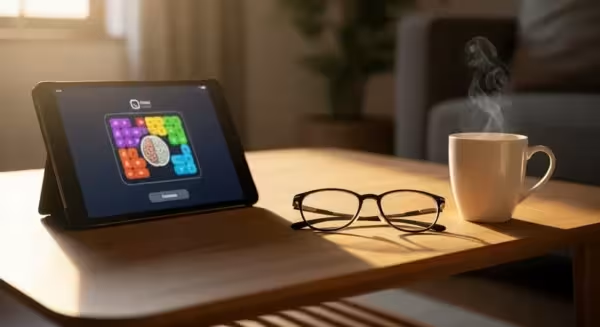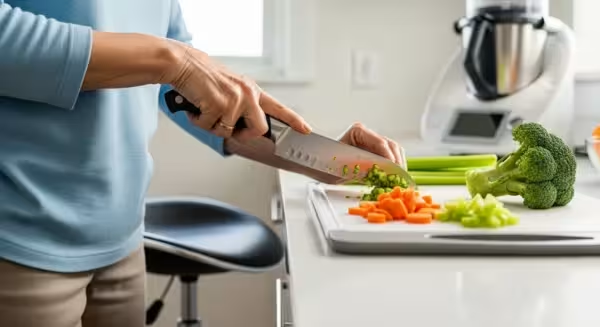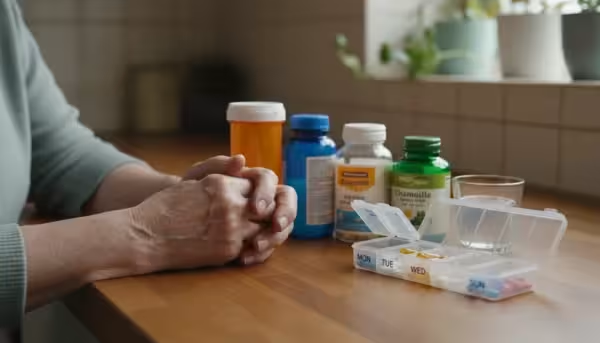Managing Multiple Medications: A Senior’s Organizational Guide
Managing multiple medications becomes a common reality for many seniors. As you age, your body changes, and your healthcare needs often grow more complex. You might find yourself juggling prescriptions for chronic conditions, over-the-counter remedies for daily aches, and various supplements for overall wellness. This complex regimen, sometimes referred to as polypharmacy, can feel overwhelming. Statistics from the Centers for Disease Control and Prevention (CDC) indicate that nearly 85% of older adults take at least one prescription medication, and over 50% take three or more, with many also using non-prescription drugs and dietary supplements. Successfully managing your medications is not just about taking pills, it is about safeguarding your health, preventing adverse reactions, and ensuring each medication works effectively for your well-being. This guide offers practical strategies and actionable advice to help you organize your medication routine, maintain your safety, and empower you in your healthcare journey.
Table of Contents
- Understanding the Challenge: Why Medication Management Matters
- Your Medication Inventory: The First Critical Step
- Pill Organization Systems: Finding Your Best Fit
- Implementing a Medication Tracking System
- Navigating Prescriptions and Refills
- Communicating with Your Healthcare Team
- Recognizing and Avoiding Medication Risks
- Technology and Medication Management: Modern Tools
- Empowering Yourself: Proactive Steps for Better Health
- Medical Disclaimer
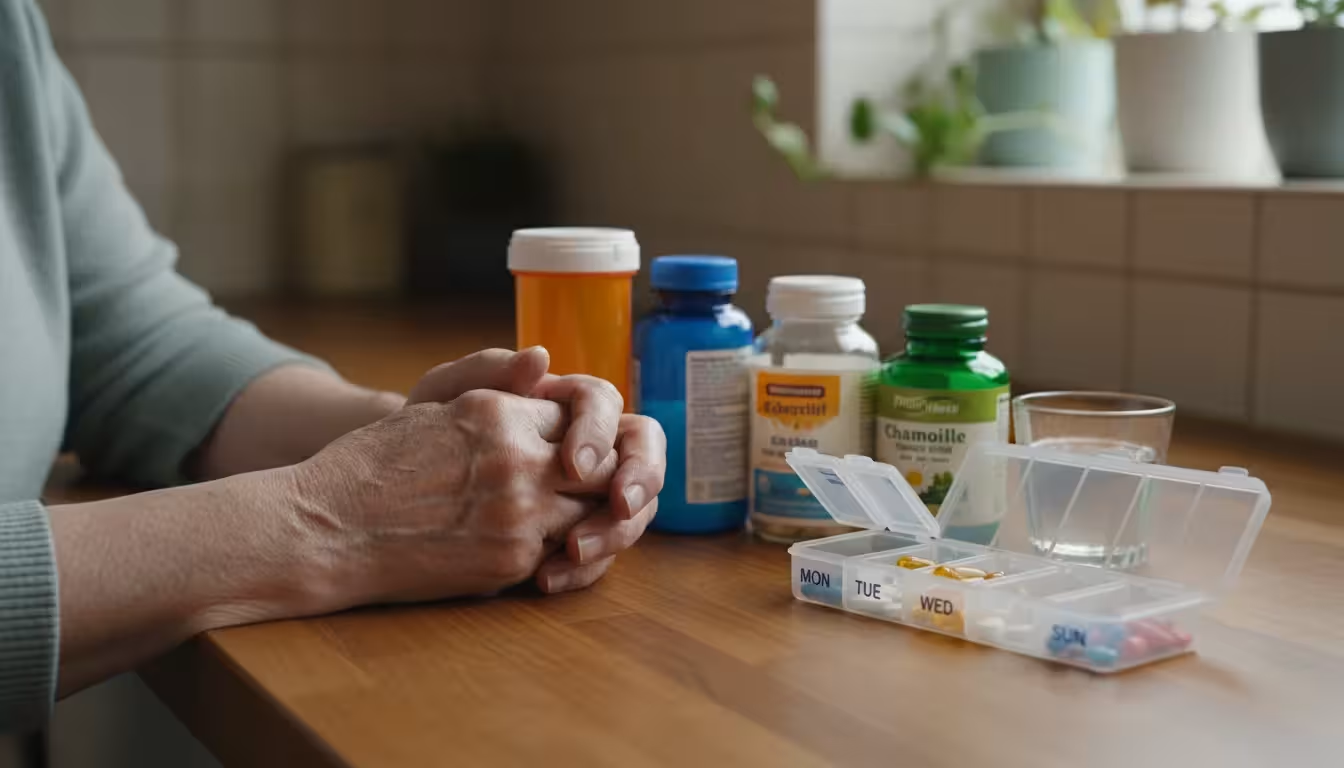
Understanding the Challenge: Why Medication Management Matters
Living with multiple health conditions often means taking various medications. This reality, often called polypharmacy, involves regularly using five or more medications, including prescription drugs, over-the-counter remedies, vitamins, and herbal supplements. While these medications are crucial for managing your health, they also introduce potential risks if not managed carefully. The National Institute on Aging (NIA) highlights that older adults face a higher risk of adverse drug events because of changes in their bodies that affect how medications are absorbed, distributed, metabolized, and excreted. Your kidneys and liver may not work as efficiently as they once did, making it harder for your body to process drugs, which can lead to medications staying in your system longer and potentially causing more side effects.
Effective medication management goes beyond simply remembering to take your pills. It involves understanding what each medication does, recognizing potential side effects, and knowing how different substances interact. Mismanaging medications can lead to serious consequences, such as:
- Reduced Efficacy: Taking incorrect doses or missing doses can render your medications less effective, failing to control your conditions properly.
- Adverse Drug Events: These events range from mild discomfort, like nausea or dizziness, to severe, life-threatening reactions. They can arise from drug-drug interactions, drug-food interactions, or simply an incorrect dosage.
- Hospitalizations: The CDC reports that adverse drug events cause approximately 1.3 million emergency department visits each year in the United States. Seniors are particularly vulnerable to these events, which can lead to extended hospital stays and significant health decline.
- Financial Burden: Ineffective medication use can lead to wasted prescriptions, additional doctor visits, and more urgent care needs, increasing your healthcare costs.
- Decreased Quality of Life: Persistent side effects or uncontrolled symptoms from poor medication adherence can significantly impact your daily activities and overall well-being.
By proactively organizing your medication routine, you gain control over your health. You reduce your risk of complications, improve the effectiveness of your treatments, and maintain a higher quality of life. This guide empowers you with the tools and knowledge to achieve this vital control.

Your Medication Inventory: The First Critical Step
Before you can organize your medications, you need a complete and accurate understanding of everything you take. Creating a comprehensive medication inventory serves as your foundational tool for effective medication management. This detailed list should include every item you consume for your health, not just prescription drugs. Many seniors, for example, rely on over-the-counter pain relievers or daily vitamins without considering them part of their “medication” list. However, these items can interact with your prescriptions, so including them is crucial for your safety.
How to Create Your Master Medication List:
- Gather Everything: Collect all your prescription bottles, over-the-counter medications, vitamins, herbal remedies, and dietary supplements.
- Record Key Information: For each item, record the following details. You can use a notebook, a spreadsheet, or a dedicated medication logbook.
- Medication Name: Both the brand name and the generic name, if applicable.
- Dosage: The strength of the medication (e.g., 10 mg, 250 mcg).
- Form: Pill, capsule, liquid, patch, inhaler, injection.
- Frequency: How often you take it (e.g., once daily, twice a day, every other day).
- Time of Day: Specific times you take it (e.g., morning, noon, evening, bedtime, with food, on an empty stomach).
- Reason for Taking: What condition it treats (e.g., high blood pressure, diabetes, pain, anxiety).
- Prescribing Doctor: The name of the doctor who prescribed it.
- Pharmacy: Where you fill the prescription.
- Start Date: When you began taking the medication.
- End Date: If it is a short-term medication (e.g., antibiotics).
- Special Instructions: Any specific notes, such as “do not crush” or “avoid grapefruit.”
- Update Regularly: Your medication list is a living document. Update it immediately whenever a doctor changes a dosage, discontinues a medication, or adds a new one. Do not forget to update it for over-the-counter items too.
- Make Copies: Keep one copy in a central, easily accessible location at home. Give copies to family members or trusted caregivers, and bring a copy to every doctor’s appointment.
This comprehensive list empowers you. It helps your doctors and pharmacists see the full picture of your health. This clarity allows them to identify potential drug interactions or duplications, ensuring your treatment plan remains safe and effective. It transforms a scattered collection of bottles into an organized, actionable health record.
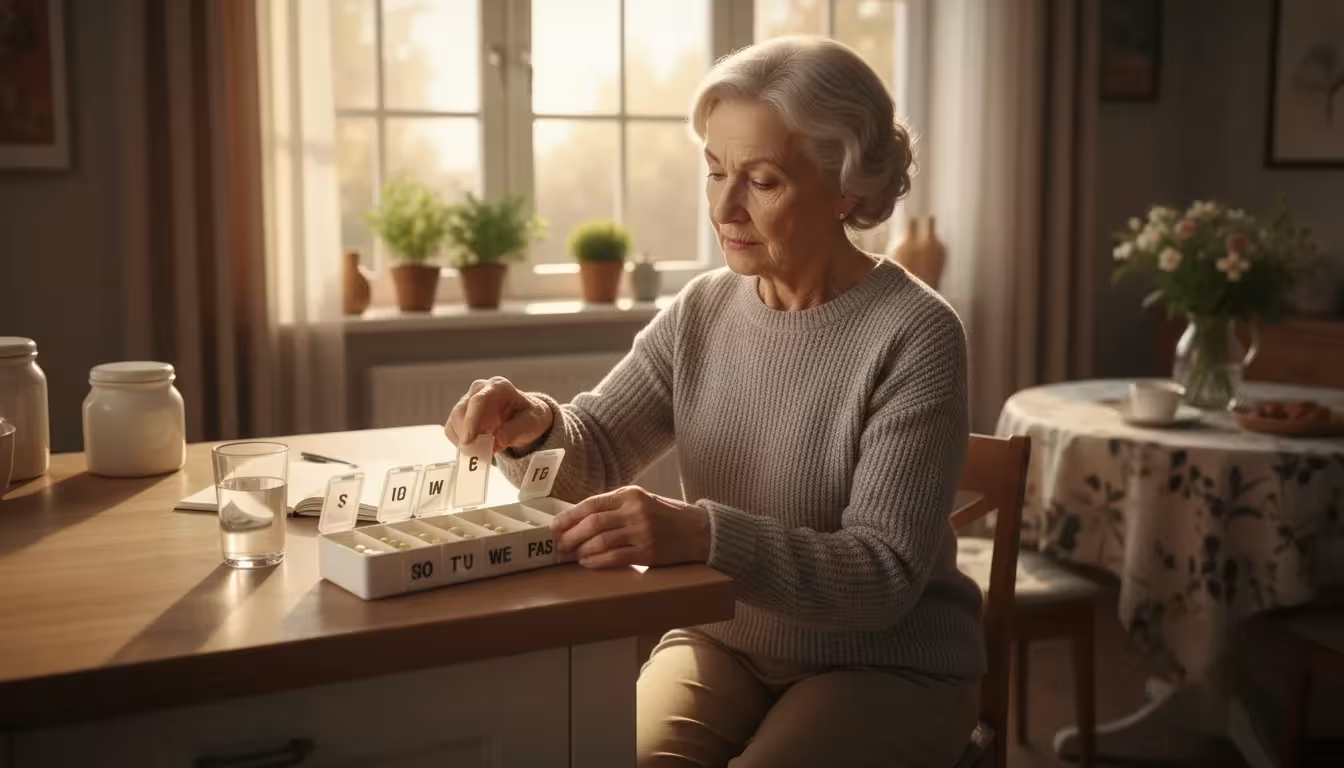
Pill Organization Systems: Finding Your Best Fit
Once you have a clear inventory, the next step involves choosing a system to organize your daily medication intake. The right system minimizes confusion, reduces missed doses, and enhances senior medication safety. Your choice depends on the number of medications you take, their complexity, and your personal preferences and physical abilities. For instance, if you have dexterity challenges, larger pill compartments or automated dispensers might be more suitable.
Common Pill Organization Systems:
- Weekly Pill Boxes: These popular organizers feature compartments for each day of the week, often with separate sections for morning, noon, evening, and bedtime doses. They are excellent for managing a consistent daily regimen.
- Benefit: Visually confirms if you took your medication for a specific time and day.
- Action: Refill once a week, perhaps on the same day, to establish a routine.
- Monthly Pill Organizers: Similar to weekly boxes, these provide compartments for an entire month. They reduce the frequency of refilling, which can be helpful for those who prefer less frequent organization tasks.
- Blister Packs or Bubble Packs: Some pharmacies offer medications pre-packaged in sealed blister packs, with each dose clearly labeled by day and time. This system significantly reduces errors and is particularly beneficial for complex regimens.
- Benefit: Pharmacist-prepared, ensuring accuracy and hygiene.
- Action: Ask your pharmacy if they offer this service. It can be a game-changer for senior medication safety.
- Automated Pill Dispensers: These electronic devices dispense the correct dose at programmed times, often with audio and visual alarms. Some even connect to an app that notifies a caregiver if a dose is missed.
- Benefit: High level of accuracy and reminders, ideal for those with memory concerns or complex schedules.
- Action: Research various models to find one that fits your budget and specific needs. Look for features like battery backup and medication capacity.
- Medication Reminder Apps: Your smartphone or tablet can become a powerful tool for medication management. Numerous apps offer customizable reminders, dose tracking, and even drug interaction alerts.
- Benefit: Portability and flexibility, often includes additional features like medication information.
- Action: Explore apps like Medisafe, MyTherapy, or Dosecast, which are highly rated for managing multiple medications for seniors.
When selecting a system, consider your lifestyle and any physical limitations. If you have trouble opening small compartments, choose an organizer with larger, easier-to-open lids. If you travel frequently, a compact weekly box might suit you better. The goal is to choose a system that simplifies your routine, not complicates it.
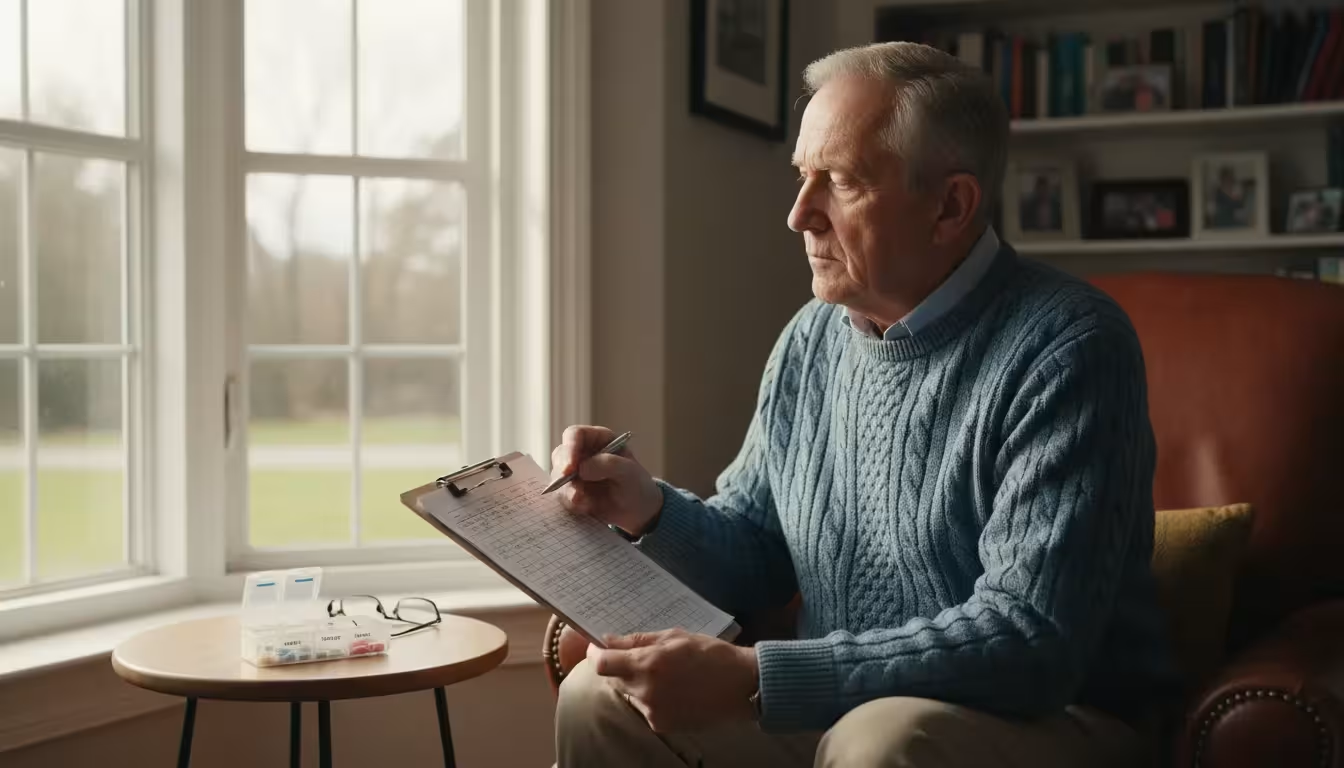
Implementing a Medication Tracking System
Beyond organizing your pills, tracking your medication intake provides an additional layer of safety and accountability. A robust medication tracking system helps you monitor adherence, identify missed doses, and accurately report your medication routine to your healthcare providers. This vital information empowers your doctor to make informed decisions about your treatment plan.
Methods for Tracking Your Medications:
- Manual Logs or Charts: A simple paper chart or notebook works well for many people. Create a grid with days of the week and times of day, then check off each medication as you take it.
- Benefit: Low-tech, easy to understand, and always accessible.
- Action: Design a chart that matches your daily regimen. Keep it near your pill organizer and a pen handy.
- Medication Tracking Apps: As mentioned previously, many smartphone and tablet apps offer tracking features. These apps typically allow you to log doses, set reminders, and often generate reports that you can share with your doctor.
- Benefit: Convenient, often includes visual confirmation and historical data.
- Action: Download a user-friendly app and spend time familiarizing yourself with its features.
- Using Your Pill Organizer as a Tracker: For many, simply seeing the empty compartments in a weekly or monthly pill box serves as an immediate visual confirmation that they have taken their doses.
- Benefit: Simple, integrated with your organization system.
- Action: Always refill your organizer on a consistent day each week.
Benefits of Consistent Medication Tracking:
- Improved Adherence: Tracking helps you maintain a consistent schedule, significantly reducing missed doses. Research consistently shows that good adherence leads to better health outcomes, particularly for chronic conditions like hypertension and diabetes.
- Early Detection of Issues: If you consistently forget a particular dose, your tracking system will highlight this pattern. This allows you to adjust your routine or discuss challenges with your doctor or pharmacist.
- Accurate Reporting to Doctors: When you visit your doctor, you can present a clear record of your medication intake. This eliminates guesswork and provides your doctor with precise data, enabling them to assess medication effectiveness, side effects, and potential adjustments more accurately.
- Empowered Self-Management: Actively tracking your medications gives you a sense of control and involvement in your own healthcare. It fosters a proactive approach to your well-being.
Choose a tracking system that aligns with your lifestyle and comfort level with technology. Consistency is the most important factor in its success.

Navigating Prescriptions and Refills
Effectively managing your prescriptions involves more than just taking them; it also requires understanding how to obtain and maintain a consistent supply. Navigating refills, understanding generic options, and choosing a pharmacy strategically can significantly streamline your medication management process.
Key Strategies for Prescription Management:
- Consolidate Your Pharmacies: Whenever possible, use a single pharmacy for all your prescriptions. This allows pharmacists to have a complete record of your medications, making it easier for them to identify potential drug interactions, duplications, or allergies. It also simplifies the refill process for you.
- Understand Your Refill Schedule: Keep track of when each prescription needs to be refilled. Many pharmacies offer automatic refill services or will send you reminders via text, email, or phone. Aim to request refills a few days before you run out, especially for critical medications, to avoid any gaps in your treatment.
- Consider Mail-Order Pharmacies: For maintenance medications you take consistently, mail-order pharmacies can be a convenient and cost-effective option. They often offer a 90-day supply, which reduces the frequency of refills and may provide cost savings. Check with your insurance provider about their preferred mail-order services.
- Ask About Generics: Generic medications contain the same active ingredients, dosage, strength, safety, and quality as their brand-name counterparts. They are often significantly less expensive. Always ask your doctor or pharmacist if a generic version is available and appropriate for your condition. The FDA rigorously reviews generic drugs to ensure their equivalence and safety.
- Review Costs and Insurance Coverage: Medication costs can vary widely. Understand your insurance plan’s formulary, which is its list of covered drugs. If a prescribed medication is not covered or is too expensive, ask your doctor about alternative medications that are on your formulary or consider patient assistance programs.
- Know Your Prescription Numbers: Keep a record of your prescription numbers. This information speeds up the refill process, particularly if you need to call the pharmacy or use an online portal.
By taking an active role in managing your prescription logistics, you reduce stress, save money, and ensure a continuous supply of the medications you need for your health.

Communicating with Your Healthcare Team
Your healthcare providers, including your doctors, specialists, and pharmacists, are your most valuable allies in managing multiple medications. Open and honest communication with them is paramount for your safety and treatment effectiveness. Do not hesitate to ask questions or express concerns; they are there to help you navigate your health journey.
Effective Communication Strategies:
- Bring Your Medication List to Every Appointment: Your comprehensive medication inventory (including prescriptions, OTCs, and supplements) should accompany you to every doctor’s visit. This provides your healthcare provider with an immediate, accurate snapshot of your current regimen. They can then identify potential issues, make informed adjustments, and avoid prescribing medications that might interact negatively with what you already take.
- Ask Specific Questions: Do not leave an appointment until you understand why you are taking a new medication, how to take it, and what to expect.
- “Why am I taking this medication?” Understand its purpose.
- “How and when should I take it?” Clarify dosage, frequency, and whether to take it with or without food.
- “What are the potential side effects, and what should I do if I experience them?” Know what to look for and when to call your doctor.
- “Does this medication interact with anything else I am currently taking, including my over-the-counter drugs or supplements?” This is where your comprehensive list becomes critical.
- “How long will I need to take this medication?” Understand the treatment duration.
- Discuss Concerns About Side Effects: If you experience any new or worsening symptoms after starting a medication, report them promptly. Do not assume they are unrelated. Your doctor can assess if they are side effects, drug interactions, or symptoms of another condition. Never stop a medication without consulting your doctor first.
- Involve Family or Caregivers: If you have a trusted family member or caregiver, consider bringing them to your appointments. They can help take notes, remember questions, and assist in clarifying instructions. This provides an extra layer of support for your medication management.
- Utilize Your Pharmacist as a Resource: Your pharmacist is a highly accessible medication expert. They can answer questions about dosages, side effects, interactions, and proper storage. They often conduct medication reviews, which involve going through all your medications to check for safety and efficacy. Do not hesitate to ask your pharmacist for a one-on-one consultation. Many pharmacies offer this service free of charge.
Proactive communication ensures that your entire healthcare team works together, with you at the center, to optimize your medication plan and promote your overall well-being. A 2019 study published in The American Journal of Managed Care found that comprehensive medication management, often involving pharmacists, significantly reduced medication-related problems and improved patient outcomes.

Recognizing and Avoiding Medication Risks
While medications are vital for health, they also carry inherent risks, especially for seniors. Your body processes drugs differently as you age, increasing the potential for side effects and adverse reactions. Understanding these risks and actively working to mitigate them is a crucial aspect of senior medication safety.
Key Risks and How to Avoid Them:
- Common Side Effects in Seniors: Older adults are more susceptible to certain side effects. These include dizziness, drowsiness, confusion, falls, constipation, and dry mouth.
- Action: Be aware of these common side effects. Report any new or unusual symptoms to your doctor or pharmacist. They may adjust your dosage or suggest a different medication.
- Drug-Drug Interactions: When two or more medications react with each other, they can cause unexpected or harmful side effects. This includes interactions between prescription drugs, over-the-counter medicines, and supplements.
- Action: Always provide your doctor and pharmacist with a complete list of all medications, supplements, and herbal remedies you take. Use a single pharmacy if possible to allow for comprehensive interaction checks.
- Drug-Food Interactions: Certain foods or beverages can interfere with how your body absorbs or metabolizes medications. For example, grapefruit juice can interact with many drugs, including statins, and vitamin K-rich foods can affect blood thinners like warfarin.
- Action: Ask your doctor or pharmacist about any specific dietary restrictions or recommendations for each medication you take. Read medication labels carefully.
- Over-the-Counter (OTC) and Supplement Risks: Many people mistakenly believe OTCs and natural supplements are harmless. However, they can still cause significant interactions or side effects. Pain relievers like ibuprofen can worsen high blood pressure or affect kidney function, especially with prolonged use.
- Action: Treat OTCs and supplements with the same caution as prescription drugs. Always include them on your medication list and discuss their use with your doctor or pharmacist.
- Safe Storage of Medications: Proper storage maintains medication effectiveness and prevents accidental ingestion. Most medications require storage in a cool, dry place away from direct sunlight and humidity. Avoid storing medications in the bathroom medicine cabinet, as humidity from showers can degrade them.
- Action: Read the storage instructions on each medication label. Keep all medications out of reach of children and pets.
- Proper Disposal of Old Medications: Keeping expired or unused medications can lead to accidental ingestion, misuse, or abuse. Flushing medications down the toilet or throwing them in the trash can also harm the environment.
- Action: Participate in community drug take-back programs or use authorized disposal sites. The FDA provides clear guidelines on how to safely dispose of most medications by mixing them with undesirable substances like coffee grounds or cat litter and placing them in a sealed bag before throwing them in household trash.
By proactively addressing these risks, you safeguard your health and optimize the benefits of your medication regimen. Stay vigilant, ask questions, and partner with your healthcare team to ensure your senior medication safety.
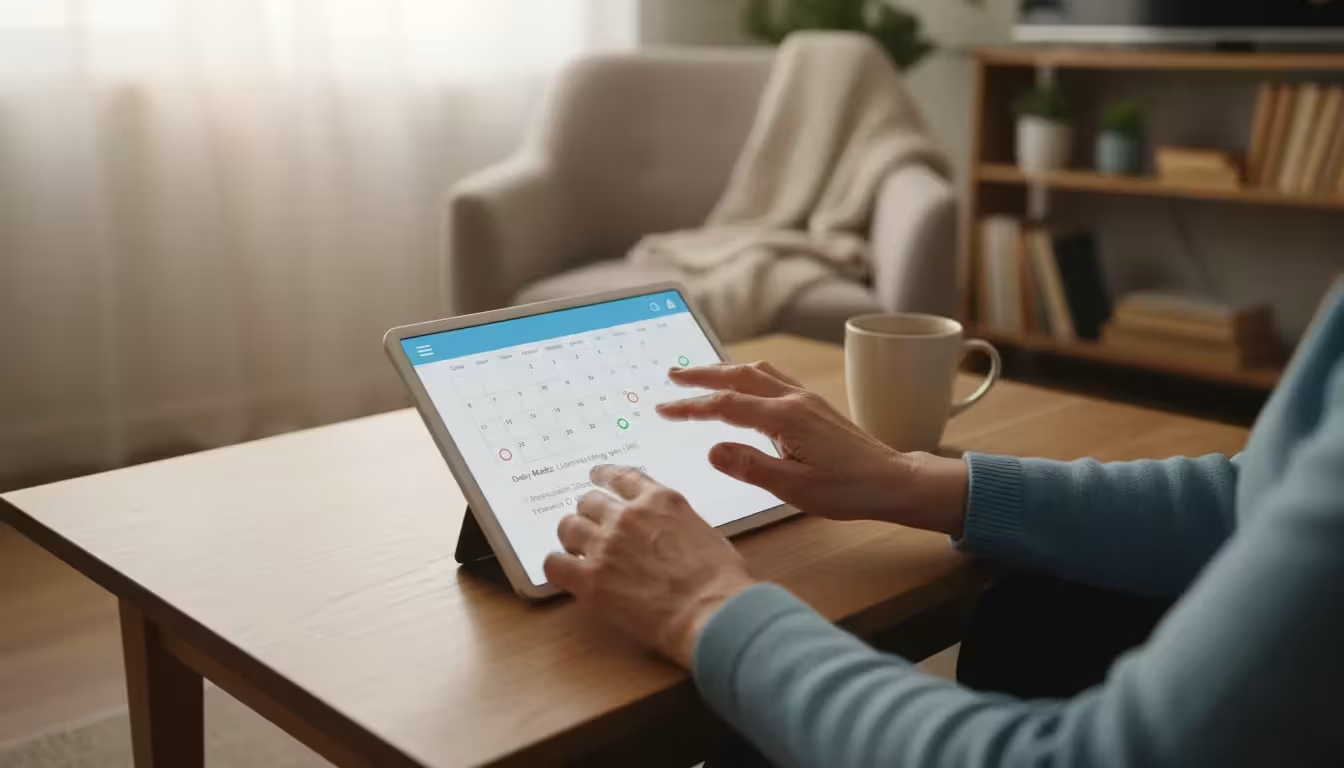
Technology and Medication Management: Modern Tools
In today’s digital age, technology offers powerful tools to simplify medication management for seniors. These innovations can provide reminders, track adherence, and even connect you with healthcare professionals remotely. Embracing these tools can enhance your independence and accuracy in managing your health.
Technological Aids for Medication Management:
- Smartphone and Tablet Apps: Numerous apps are designed specifically for medication management. They offer features such as customizable dose reminders, medication tracking logs, drug information databases, and even refill alerts. Some apps allow you to create a visual medication list with photos of your pills.
- Examples: Medisafe, MyTherapy, Dosecast.
- Benefit: Portability, multiple features in one place, and often user-friendly interfaces.
- Action: Explore different apps. Many offer free versions with essential features. Choose one that you find intuitive and reliable.
- Smart Pill Dispensers: These advanced devices take automated pill organization to the next level. They dispense the correct medication and dosage at scheduled times, often with audio and visual cues. Some models offer locking mechanisms to prevent accidental overdosing and can notify family members or caregivers if a dose is missed.
- Benefit: High level of security and reassurance, especially helpful for individuals with memory challenges or those living alone.
- Action: Research various smart dispensers. Consider features like medication capacity, battery life, internet connectivity, and caregiver alerts.
- Wearable Devices with Reminders: Some smartwatches or fitness trackers offer medication reminder functions. These discreet vibrations or notifications on your wrist can serve as a gentle nudge to take your pills, integrating seamlessly into your daily routine.
- Benefit: Discreet, always on you, and convenient for on-the-go reminders.
- Action: Check if your existing wearable device has this feature or explore models that prioritize health and reminder functions.
- Telehealth for Medication Reviews: Telemedicine allows you to consult with your doctor or pharmacist remotely from the comfort of your home. This is particularly useful for medication reviews, where you can discuss your entire regimen, side effects, and concerns without the need for a physical office visit.
- Benefit: Convenience, reduced travel burden, and continued access to expert advice.
- Action: Ask your healthcare providers if they offer telehealth services for medication management. Prepare your medication list in advance for these virtual appointments.
While technology offers significant advantages, remember that these tools are aids, not replacements for careful attention to your medication regimen or communication with your healthcare team. Always ensure you feel comfortable using the technology you choose. If you need assistance, do not hesitate to ask a trusted family member or friend for help setting up and learning how to use these modern tools effectively.

Empowering Yourself: Proactive Steps for Better Health
Successfully managing multiple medications is a continuous process that puts you in the driver’s seat of your health. By adopting a proactive and informed approach, you empower yourself to navigate the complexities of your medication regimen with confidence and ensure your ongoing well-being. This journey involves consistent effort and a commitment to your health.
Proactive Steps for Enhanced Medication Management:
- Schedule Regular Medication Reviews: Make it a habit to review all your medications, including OTCs and supplements, with your doctor or pharmacist at least once a year, or more frequently if your health status changes or new medications are added. During this review, your healthcare provider can assess if certain medications are still necessary, if dosages need adjustment, or if any medications are causing adverse effects. This process, often called deprescribing, aims to reduce the number of medications taken, improving safety and reducing pill burden. The Mayo Clinic strongly advocates for regular medication reviews, emphasizing their role in preventing adverse drug events.
- Be Your Own Health Advocate: You know your body best. If something feels off, if you have questions, or if you feel a medication is not working, speak up. Do not hesitate to ask for clarification, a second opinion, or alternative treatment options. Your active participation in your healthcare decisions is crucial.
- Stay Informed and Educated: Understand your medical conditions and the medications prescribed to treat them. Read patient information leaflets, ask questions, and seek reliable information from trusted sources like the National Institute on Aging (NIA) or your pharmacist. Knowledge empowers you to make informed decisions and detect potential problems early.
- Establish a Consistent Routine: Humans are creatures of habit. Integrate your medication routine into your daily life. Take pills at the same time each day, perhaps with a meal or alongside another regular activity like brushing your teeth. Consistency minimizes forgotten doses.
- Utilize Your Support Network: Do not feel you must manage your medications alone. Involve a trusted family member, friend, or caregiver. They can help with organization, offer reminders, or accompany you to appointments to act as an extra set of ears. Sharing the responsibility can reduce stress and increase adherence.
- Practice Patience and Self-Compassion: Managing multiple medications can be challenging. There will be days when you forget a dose or feel overwhelmed. Approach these moments with patience, learn from them, and restart your routine. Perfection is not the goal; consistent effort toward better health is what truly matters.
By implementing these proactive steps, you transform medication management from a daunting task into a manageable and empowering aspect of your healthy aging journey. Your diligence in how to organize multiple medications for seniors directly contributes to your overall well-being and independence.

Medical Disclaimer
The information provided in this article is for educational and informational purposes only and does not constitute medical advice. It is not intended to be a substitute for professional medical advice, diagnosis, or treatment. Always seek the advice of your physician or other qualified health provider with any questions you may have regarding a medical condition or treatment and before undertaking a new health care regimen. Never disregard professional medical advice or delay in seeking it because of something you have read in this article. Relying on information from this article is solely at your own risk. Consult your healthcare provider before making any changes to your medication regimen.

